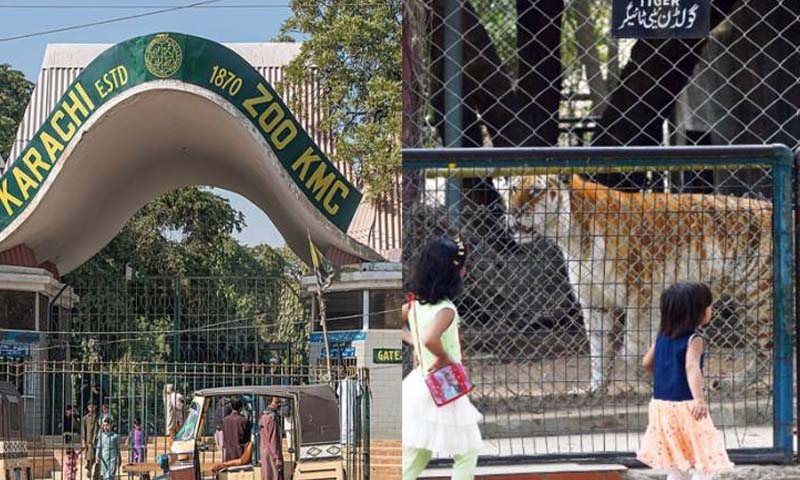KARACHI: The Sindh High Court (SHC) has sought a detailed report on the health, living conditions and staff detailed for caring of animals at Karachi Zoo.
Hearing a case concerning the relocation of a female Himalayan brown bear “Rano”to a natural habitat, the court expressed astonishment after learning that only one veterinary doctor was available for nearly 700 animals at the zoo.
During Friday’s hearing, SHC Judge Justice Iqbal Kalhoro questioned the current state of Karachi Zoo and reprimanded authorities for negligence.
Petitioner’s counsel, Jibran Nasir, informed the court that the Karachi Metropolitan Corporation (KMC) employed just one veterinary doctor to tend to hundreds of animals.
“How can one veterinarian look after so many animals?” Justice Kalhoro asked in disbelief, further remarking, “Do you people have no fear of God? You only act when television, newspapers, or civil society raise concerns.”
Earlier this week, the court had ordered that Rano — a sick female Himalayan brown bear — be shifted to a safe sanctuary for medical care.
Her deteriorating health had drawn public attention to the mistreatment and neglect of animals at the Karachi Zoo.
During the Friday’s hearing, the court sought a comprehensive report on all animals at the zoo.

Talking to the media, Jibran Nasir said that the court has sought details about the animals’ physical and mental health, their living conditions, the staff’s qualifications and training, and arrangements for potential relocations.
He said that the SHC also directed the KMC to submit information about zoo staff qualifications and asked the provincial committee overseeing Rano’s relocation.
He said that the Sindh government has been instructed to inspect the zoo and evaluate facilities available for the animals.
Calling the court’s directives a “major victory,” Jibran Nasir said that the decision resulted from the collective efforts of activists, experts, and the media who highlighted the issue.
“This humane ruling will not only improve the lives of these animals but also raise public awareness about animal rights in Pakistan,” he said.
Representing the KMC, Barrister Asad Ahmed informed the court that Rano would first be moved to Islamabad and later to Gilgit-Baltistan, with necessary preparations for safe transportation already underway.
Wildlife conservator Javed Mahar told the court that the bear could be transported either by road or air and that similar relocation exercises had been successfully conducted before.
Justice Kalhoro observed that Rano’s case was not an isolated one. “This is not about a single animal; many others are suffering too,” he remarked.
He criticised the conditions at local zoos, questioning whether animals should still be kept in cages in the 21st century. “Zoos should be closed. Animals belong in their natural habitats. It seems managing zoos here has become impossible,” the remarked.
Wildlife officials informed the court that Rano could not be forced into a container and would need to be acclimatised before relocation.
The court allowed time for this process but insisted that the transfer must be completed safely.
Advocate Jibran Nasir pointed out that zoo facilities were severely lacking, adding, “We don’t even have enough staff to ensure whether the animals are being fed properly.”
The KMC lawyer explained that hiring had been restricted due to a ban on new appointments, leading to the current shortage.
Justice Kalhoro expressed regret over the long-standing neglect of zoos in Pakistan, recalling, “Even when I was a child, zoos were in terrible condition — animals were injured, and nothing has changed.”
He criticised authorities for profiting from the zoo without spending on animal welfare and lamented the absence of a proper “national park” system that could serve as an alternative.
“In other countries, zoos are not like this — animals are not kept in cages. We want to see the end of these cages here as well,” he said.
Jibran Nasir reminded the court that Islamabad’s oldest zoo had already been shut down. Justice Kalhoro responded, “Bring this matter before us — whether zoos should exist at all — and we will decide it according to the law.”
The hearing was adjourned for two weeks, with the court seeking a progress report at the next session.
Rano’s neglect case
Rano was brought to Karachi Zoo in 2017 along with an Asiatic black bear that died in 2020. Since then, she had been kept alone in a small enclosure. A report earlier this year by an inquiry committee found her showing signs of severe mental distress and unusual behaviour, recommending her relocation to a safe facility in Punjab and a DNA test to confirm her species.
Experts have since identified Rano as a rare Himalayan brown bear, disputing the zoo’s claim that she was a Syrian bear.
Later investigations revealed that the KMC had failed to act on the committee’s recommendations, and Rano remained in isolation.
Earlier this month, reports emerged that she had sustained a head injury that had become infected due to lack of medical care.
KMC spokesperson Daniyal Siyal confirmed that the wound was under treatment but claimed that the injury was self-inflicted as Rano had repeatedly struck her head against the cage bars.
Following a petition filed by animal rights activist Jude Allen Pereira, the SHC took notice of the matter and rebuked the KMC for neglecting the bear.
The court ordered that Rano be handed over to the Islamabad Wildlife Management Board immediately — a move the petitioner hailed as “a major victory for Rano.”
In August 2023, a young chimpanzee named Raju was discovered lifeless in his enclosure at the Karachi Zoological Gardens.

